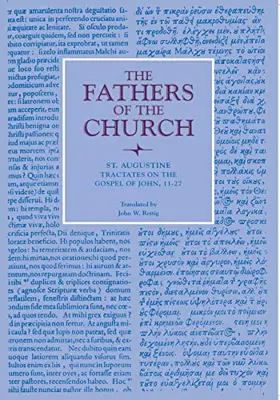

Tractates on John, Volume 2 (11–27)
Pages
306
Publisher
Catholic University of America Press
Published
12/31/1988
ISBN-13
9780813213606
Of the 124 tractates that St. Augustine delivered to his congregation at Hippo Regius, the first fifty-four form a distinct group. They differ in length and character from the remaining tractates, contain many chronological references, and consist of bitter attacks on the Donatists and other heresies. The remaining tractates (55-124) are brief and contain no chronological references to prior tractates. Scholars maintain that the latter were dictated for later reading to the people rather than extemporaneously delivered.
This volume contains tractates 11-27. In 11-16 Augustine continues the attack, begun in tractates 1-10, on the heresies of Manichaeism, Donatism, and Pelagianism. Beginning with the seventeenth tractate, however, he focuses greater attention on Arianism, a Trinitarian heresy whose major tenet was that divine being was uncreated, unbegotten, and unique and that Christ was not true God but a creature who had a beginning. Augustine also attacks lesser Christological heresies: the Apollinarists, who assert that Christ did not assume the complete human nature but only the body, and Photinus of Sirmium, who held that Christ did not except for his miraculous birth and acquired a plenitude of grace through moral perfection.
In these tractates Augustine combines scriptural exegesis, the refutation of false teachings, and theological reflections with the spiritual and moral instruction of his congregation. "Look for separation in the Father and Son, you do not find it; even if you have soared high, then you do not find it; if you have touched something beyond your intellect, then you do not find it. For if you busy yourself in these things which the erring mind makes for itself, you speak with your own images, not with the Word of God; your images deceive you. Transcend the body and savor the mind. Transcend the mind also and savor God."
This volume contains tractates 11-27. In 11-16 Augustine continues the attack, begun in tractates 1-10, on the heresies of Manichaeism, Donatism, and Pelagianism. Beginning with the seventeenth tractate, however, he focuses greater attention on Arianism, a Trinitarian heresy whose major tenet was that divine being was uncreated, unbegotten, and unique and that Christ was not true God but a creature who had a beginning. Augustine also attacks lesser Christological heresies: the Apollinarists, who assert that Christ did not assume the complete human nature but only the body, and Photinus of Sirmium, who held that Christ did not except for his miraculous birth and acquired a plenitude of grace through moral perfection.
In these tractates Augustine combines scriptural exegesis, the refutation of false teachings, and theological reflections with the spiritual and moral instruction of his congregation. "Look for separation in the Father and Son, you do not find it; even if you have soared high, then you do not find it; if you have touched something beyond your intellect, then you do not find it. For if you busy yourself in these things which the erring mind makes for itself, you speak with your own images, not with the Word of God; your images deceive you. Transcend the body and savor the mind. Transcend the mind also and savor God."